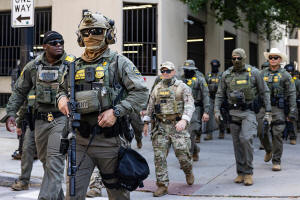Illinois governor says troops could be deployed to Chicago as
immigration agents patrol downtown
[September 30, 2025]
By SOPHIA TAREEN
CHICAGO (AP) — The sight of armed, camouflaged and masked Border Patrol
agents making arrests near famous downtown Chicago landmarks has
amplified concerns about the Trump administration's growing federal
intervention across U.S. cities.
As Illinois leaders warned Monday of a National Guard deployment,
residents in the nation’s third-largest city met a brazen weekend
escalation of immigration enforcement tactics with anger, fear and fresh
claims of discrimination.
“It looks un-American,” said Chicago Alderman Brandon Reilly, who
represents downtown on the City Council. He deemed the Sunday display a
“photo opp” for President Donald Trump, echoing other leaders.
Memphis, Tennessee, and Portland, Oregon, also braced for a federal law
enforcement surge. Meanwhile, Louisiana’s governor asked for a National
Guard deployment to New Orleans and other cities.
Trump has called the expansion of federal immigration agents and
National Guard troops into American cities necessary, blasting Democrats
for crime and lax immigration policies. Following a crime crackdown in
the District of Columbia and immigration enforcement in Los Angeles,
he’s referred to Portland as “war-ravaged” and threatened apocalyptic
force in Chicago.
“Whether it takes place here in the city or the suburbs, it’s all the
same to us,” Border Patrol agent Gregory Bovino said in Chicago.
Attorney General Pam Bondi has issued a memo that also directs component
agencies within the Justice Department, including the FBI, to help
protect U.S. Immigration and Customs Enforcement facilities, including
in Chicago and Portland.
Here’s a snapshot of where things stand with federal law enforcement
activity in Chicago, Portland, Memphis and New Orleans.

Chicago raises alarm about racial profiling
Many Chicagoans were already uneasy after an immigration crackdown began
earlier this month. Agents have targeted immigrant-heavy and largely
Latino areas.
Trump has waffled on sending the military, but Democratic Gov. JB
Pritzker said Monday it appeared the federal government would deploy 100
troops. Pritzker said the Illinois National Guard received word that the
Department of Homeland Security sent a memo to the Defense Department
requesting troops to protect ICE personnel and facilities.
An immigration processing center outside Chicago has been the site of
frequent protests and aggressive tactics by federal agents.
The enforcement recently escalated, with agents using boats on the
Chicago River and marching Sunday on Michigan Avenue and in upscale
neighborhoods.
Activists and elected leaders are concerned about discriminatory stops,
particularly after the U.S. Supreme Court lifted restrictions on roving
patrols in LA. The court cleared the way for immigration agents to stop
people based on race, language, job or location.
“ICE is running around the Loop, harassing people for not being white,”
Pritzker said, describing the city's core business district.
Activists said a Latino family of four was led away by federal agents
Sunday near the popular “Cloud Gate” sculpture, commonly called “The
Bean.” Construction workers and bicyclists were also targeted.
“The downtown operation of being racially profiled and kidnapped by
immigration in broad daylight represents a major escalation by the Trump
administration,” said Veronica Castro with Illinois Coalition for
Immigrant and Refugee Rights.
Bovino told The Associated Press that agents will go after “anyone who
is here illegally,” an approach that fell under immigration authority,
known as Title 8. He told the Chicago Sun-Times that a person’s
appearance goes into the calculation.
“It would be agent experience, intelligence that indicates there’s
illegal aliens in a particular place or location,” he told the
newspaper. “Then, obviously, the particular characteristics of an
individual, how they look.”
DHS did not return messages Monday.

Chicagoans trail Border Patrol
As Border Patrol agents marched near downtown, a few onlookers nodded in
approval and shouted praise while a trail of activists and others urged
agents to leave.
Shirley Zuniga was celebrating her 24th birthday when she saw agents.
Still wearing a pink birthday sash, she left brunch to follow them.
Zuniga, among the first in her family of Honduran immigrants to be born
in the United States, said she forgot all about her birthday plans as
she yelled at the agents to go home.
[to top of second column]
|

Federal agents from U.S. Immigration and Customs Enforcement and
U.S. Customs and Border Protection walk north on North Clark Street
in the River North neighborhood, Sunday, Sept. 28, 2025, in Chicagp.
(Ashlee Rezin/Chicago Sun-Times via AP)

“This is much more important to me,” she said as she grew emotional.
“I’m celebrating my people.”
Portland goes to court
In Oregon, Democratic Attorney General Dan Rayfield filed a motion
in federal court Monday seeking to temporarily block the Trump
administration from deploying the National Guard.
The motion is part of a lawsuit Rayfield filed Sunday, after state
leaders received a Defense Department memo that said 200 members of
the state’s National Guard will be placed under federal control for
60 days to “protect Federal property, at locations where protests
against these functions are occurring or are likely to occur.”
Portland Mayor Keith Wilson and Democratic Gov. Tina Kotek are among
local leaders who object to the deployment.
“Putting our own military on our streets is an abuse of power and a
disservice to our communities and our service members,” Rayfield
said in a statement Monday.
The ICE building outside of Portland's downtown has been the site of
nightly protests that peaked in June, with smaller clashes occurring
since then.
A larger crowd demonstrated at the building Sunday. Two people were
arrested for assault, according to authorities. That followed a
peaceful march earlier in the day that drew thousands to the city’s
downtown and saw no arrests, police said.
Some residents are already frustrated.
The building manager of the affordable housing complex adjacent to
the ICE building said “the impacts of violent tactics, including
tear gas and late-night altercations, are traumatizing for
residents,” including the veterans who live there.
“Sending federal troops will only escalate the situation. The last
thing we need is an escalation,” Reach Community Development said in
statement.
Meanwhile, federal agents on Monday searched a home associated with
someone who allegedly aimed a laser at a U.S. Customs and Border
Protection helicopter as it flew over Portland on Saturday evening,
the FBI said. Four people, who were found to be in the country
illegally, were detained and placed under the custody of ICE,
according to the FBI, which did not specify the charges they face.
Memphis residents worry
Memphis was in wait-and-see mode Monday, the first day of a planned
federal law enforcement surge ordered by Trump to fight crime. There
were no immediate reports of large-scale federal law enforcement
operations.

Still some residents, including Latinos, expressed concerns that
immigration agents will detain people regardless of immigration
status.
“We know the presence of the National Guard will lead to our
neighbors being afraid to seek help when they need medical care,
need to report crimes, or require social services, because of this
military presence,” said Sandra Pita, a community organizer.
The city has experienced high numbers of violent crimes such as
carjackings and homicides in recent years, but both Democratic and
Republican officials have noted that the majority-Black city is
seeing decreases this year in some categories.
Louisiana's governor asks for National Guard
Republican Gov. Jeff Landry on Monday asked for a National Guard
deployment to New Orleans and other cities to help his state fight
crime.
In a letter sent to to Defense Secretary Pete Hegseth, Landry also
praised the president's decision to send troops to Washington and
Memphis.
Landry said there has been “elevated violent crime rates” in
Shreveport, Baton Rouge and New Orleans as well as shortages in
local law enforcement.
But crime in some of the state’s biggest cities has actually
decreased recently, with New Orleans, seeing a particularly steep
drop in 2025 that has put it on pace to have its lowest number of
killings in more than five decades.
___
Associated Press writers Adrian Sanz in Memphis and Claire Rush in
Portland contributed to this report.
All contents © copyright 2025 Associated Press. All rights reserved |